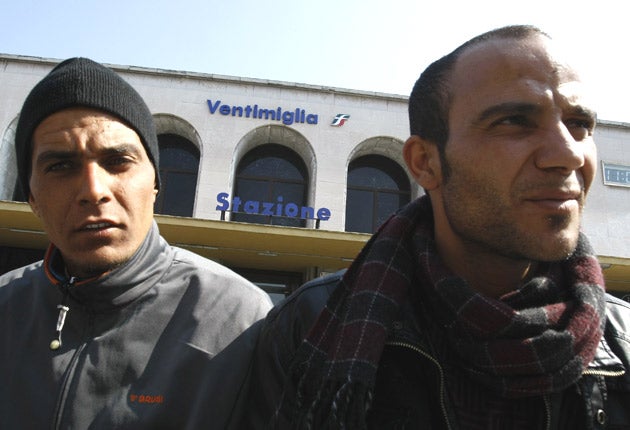EU border deal under threat in row over Italy's migrant burden

An angry dispute over the "roaming rights" of refugees from North Africa threatens to undermine the 16-year agreement that removed systematic identity checks at continental European Union borders.
The Italian Ambassador to Paris delivered a stiff formal protest yesterday after France closed its rail border with Italy for six hours on Sunday. France and Belgium have already warned that they could restore systematic border controls for travellers from Italy after Rome began to issue temporary "humanitarian" passports to thousands of Tunisian "boat-people".
The documents give the Tunisians, who have crossed the narrow strait to the Italian island of Lampedusa in recent weeks, the apparent right to roam anywhere in the EU. France and Belgium fear that the refugees from the unrest in North Africa will use the documents to settle illegally within the large Tunisian immigrant communities. Germany has also protested.
The issue is likely to dominate what promises to be a bad-tempered Franco-Italian summit in Rome next Tuesday. Italy has been angered by the refusal of France and other EU countries to "share" the burden of an estimated 25,000 Tunisian refuges who have made the short sea-crossing to Italy or Malta. Under EU migration law, asylum-seekers are supposed to remain in the country in which they first set foot, until they are accepted or expelled.
Rome says the temporary travel documents, decorated with the Italian coat of arms, are legal and justified. France says that they are neither.
In a sense, the dispute is a kind of "spaghetti Sangatte", or "Sangatte in reverse". Up to 2002, when the Red Cross camp for asylum-seekers at Sangatte near Calais closed down, Britain complained that France was, in effect, facilitating the passage of illegal immigrants across the Channel.
Even at the height of the Sangatte battle, however, France did not issue temporary travel documents which would have allowed UK-bound migrants to cross the Channel legally.
The Franco-Italian dispute has been envenomed by domestic political pressures in both countries. The Italian Prime Minister, Silvio Berlusconi, is allied with the hard-right and anti-immigrant Northern League. As part of a campaign to deflate the resurgence of the far-right National Front, France's President Nicolas Sarkozy has warned of the need to check "uncontrolled migration" from North Africa.
On Sunday France prevented all trains from crossing the border from Vintimiglia to Menton for six hours. A so-called "train of dignity", carrying 100 Tunisian refugees and 300 Italian pro-migration activists from Genoa, was refused entry to France. The passengers spilled on to the tracks at Vintimgilia chanting "Liberty" and "We are all illegals".
Italy said the blockade was "illegitimate and in clear violation of general European principles" of free movement. The action was also criticised yesterday by the main French opposition party, the Socialist Party. Rather than welcoming the political transformation of its former colony Tunisia, the French government was acting with "cowardice and stupidity", the party said.
The President of the EU Council, Herman Van Rompuy, warned against the "exaggeration" of the "dangers of mass migration" from North Africa. Neither Italy nor France had yet broken the rules of the 1995 Schengen treaty on open borders, he said, but they were in danger of offending against its "spirit".
Mr Berlusoni and Mr Sarkozy have a number of Franco-Italian disputes to resolve when they meet next Tuesday, including Italian complaints about a series of allegedly "predatory" French take-overs of Italian companies. Last week Mr Berlusconi insisted that talk of increasing hostility between Rome and Paris had been "exaggerated by the media".
"I am a friend of France, I spend my holidays there. I sing French songs," Mr Berlusconi said. "All these problems can be overcome."
Schengen explained
What is the Schengen Agreement?
In June 1985, five European Union countries – Benelux, France and West Germany – signed an agreement on a boat at Schengen on the river Moselle to remove systematic passport controls at their borders. The visible barriers between nations were to be abolished 10 years later, in 1995. The passport-free "Schengen area" now extends to 25 European countries, including three non-EU nations, Switzerland, Norway and Iceland. The principal hold-outs are Britain and Ireland.
What is the difference between Schengen and the EU right of free movement?
The right of free movement between EU countries goes back to the Treaty of Rome in 1957 and therefore also applies to Britain. Schengen was an agreement – originally outside EU law, but now within the European treaty – to remove any visible signs of frontiers and create the psychological impression of a single nation. To make that possible, it was agreed, inter alia, that there would be tighter, common rules for entering the "Schengen area" from the rest of the world.
How does that affect immigration rights?
Non-EU foreigners with a legal right to live in one EU country have a right to travel to any other member state for three months. Asylum seekers must remain in the EU country in which they first set foot. These rules also apply to the non-Schengen countries, such as the UK and Ireland. Schengen lays down, however, a series of rules on so-called Schengen Visas, which apply to short- or long-term stays by non-EU nationals.
Italy has issued temporary humanitarian residence documents to asylum seekers from Tunisia, pictured above arriving at the island of Lampedusa earlier this month. France, Belgium and Germany dispute whether they obey the Schengen criteria. France and Belgium have warned that, in retaliation, they might reintroduce passport checks for all people arriving directly from Italy (by air in Belgium's case).
Join our commenting forum
Join thought-provoking conversations, follow other Independent readers and see their replies
Comments